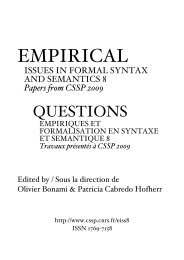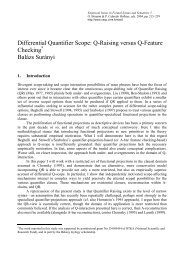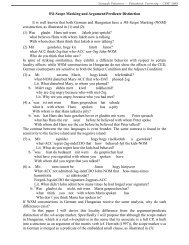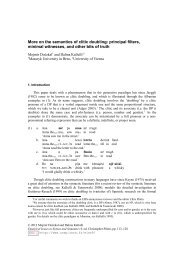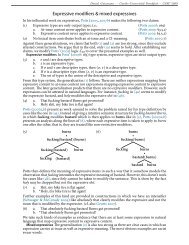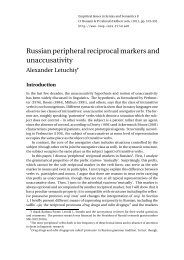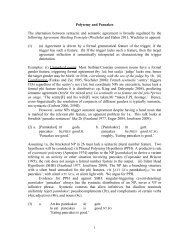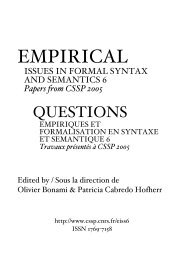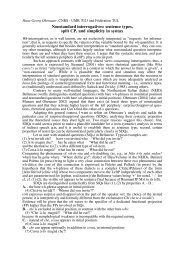Empirical Issues in Syntax and Semantics 9 (EISS 9 ... - CSSP - CNRS
Empirical Issues in Syntax and Semantics 9 (EISS 9 ... - CSSP - CNRS
Empirical Issues in Syntax and Semantics 9 (EISS 9 ... - CSSP - CNRS
You also want an ePaper? Increase the reach of your titles
YUMPU automatically turns print PDFs into web optimized ePapers that Google loves.
4.4. The role of grammaticalization<br />
In the preced<strong>in</strong>g sections, we have presented two potential difficulties for the analysis of<br />
the moods <strong>in</strong> complement clauses. With the mixed predicates, both moods may appear because<br />
their semantics is complex, <strong>and</strong> both moods may be motivated. The role of the context is to<br />
allow one or the other aspect to come to the fore, thus favor<strong>in</strong>g one or the other mood. With the<br />
polarity environments, only one mood is motivated, but both can be used.<br />
The group of mixed predicates <strong>in</strong>cludes the evaluatives (class (vi-b)). At least with the<br />
factives (regretter ‘regret’), the entity denoted by the subject (alternatively, the speaker, see<br />
§3.1) commits himself/herself to the proposition denoted by the complement, at the same time<br />
as s/he acknowledges that th<strong>in</strong>gs might have been different. Unlike the predicates mentioned <strong>in</strong><br />
§4.2, though, evaluatives always take the subjunctive <strong>in</strong> st<strong>and</strong>ard French (as opposed to<br />
Romanian, for <strong>in</strong>stance, where they allow for both moods, see above (29)). To expla<strong>in</strong> this<br />
different behavior, we appeal to grammaticalization: French has grammaticalized the<br />
subjunctive with this set of predicates. That is, the fact that they take a subjunctive complement<br />
clause is part of their subcategorization. The French lexicon <strong>in</strong>cludes for <strong>in</strong>stance the<br />
specification that regretter takes a subjunctive complement. In other words, the association of<br />
predicates of a certa<strong>in</strong> class with the choice of a mood has been frozen: the subjunctive is<br />
motivated, but the absence of the <strong>in</strong>dicative with most predicates of this class cannot be<br />
expla<strong>in</strong>ed on semantico-pragmatic grounds.<br />
Appeal<strong>in</strong>g to grammaticalization <strong>in</strong> this case requires a more liberal use of the term than is<br />
usually done: grammaticalization studies are nearly uniquely concerned with the evolution of<br />
lexemes. Some authors (see Traugott 2003) do mention the relevance of constructions, but<br />
mostly <strong>in</strong> order to talk about constructions which evolve <strong>in</strong>to lexemes. However, there does not<br />
seem to be any pr<strong>in</strong>cipled objection to apply<strong>in</strong>g the concept to the evolution of constructions<br />
which get frozen without giv<strong>in</strong>g rise to a lexeme. In fact, we f<strong>in</strong>d <strong>in</strong> Marchello-Nizia 2006 an<br />
account of the fixation of the relative order of the verb <strong>and</strong> the object NP complement s<strong>in</strong>ce the<br />
13th century <strong>in</strong> French, which appeals to grammaticalization. Certa<strong>in</strong>ly, <strong>in</strong>stances of syntactic<br />
grammaticalization do not exhibit the properties usually associated with well-known <strong>in</strong>stances<br />
of this process, but this results from the fact that most <strong>in</strong>stances which have been studied<br />
concern the lexicon rather than syntax.<br />
One might wonder why evaluatives have been specialized for a subjunctive complement.<br />
Becker (2010) shows that the gradual change from <strong>in</strong>dicative selection <strong>in</strong> Old French to the<br />
dom<strong>in</strong>ance of subjunctive selection <strong>in</strong> the 17th century is correlated with emphasis on the<br />
comparative semantics underly<strong>in</strong>g the subjunctive. However, this is <strong>in</strong>sufficient to expla<strong>in</strong> the<br />
disappearance of the <strong>in</strong>dicative complement, while predicates such as comprendre reta<strong>in</strong> both<br />
comb<strong>in</strong>ations (see §4.1). A possibility is that French uses the contrast <strong>in</strong> complement moods <strong>in</strong><br />
order to organize lexical classes <strong>and</strong> contrasts. Such predicates cover the same semantic<br />
doma<strong>in</strong>s as those <strong>in</strong> the classes tak<strong>in</strong>g the <strong>in</strong>dicative mood. However, they systematically differ<br />
from those precisely by their evaluative aspect. Hence, a systematic difference <strong>in</strong> mood may be<br />
a way to ground <strong>in</strong> the lexicon the existence of a systematic semantico-pragmatic difference.<br />
The case is similar for the less massive cases mentioned <strong>in</strong> §4.2. Probability is dist<strong>in</strong>ct from<br />
possibility specifically <strong>in</strong> that probability is closer to <strong>in</strong>dicat<strong>in</strong>g an agent’s commitment, <strong>and</strong><br />
similarly for the epistemic il semble (‘it seems’), as opposed to possibility or necessity. These<br />
lexical contrasts probably favor keep<strong>in</strong>g the <strong>in</strong>dicative, although these predicates are modals,<br />
<strong>and</strong> modal structures strongly tend towards the use of the subjunctive. F<strong>in</strong>ally, the fact that<br />
espérer (‘hope’) tends to be followed by the <strong>in</strong>dicative is often presented as a mystery of the<br />
French subjunctive (specially as grammars often say that this is a rule). But it is less of a<br />
mystery when one recognizes that it is a mixed predicate, which may take the subjunctive <strong>in</strong><br />
145



